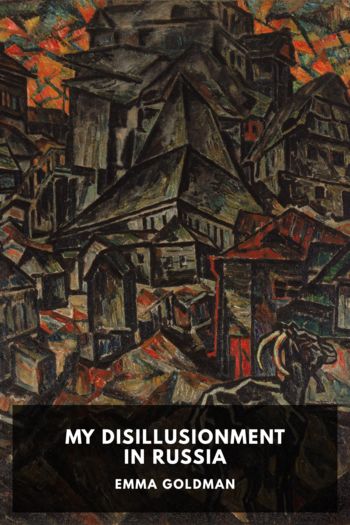My Disillusionment in Russia by Emma Goldman (books to read romance txt) 📕

- Author: Emma Goldman
Book online «My Disillusionment in Russia by Emma Goldman (books to read romance txt) 📕». Author Emma Goldman
We are in 1924. The military fronts have long ago been liquidated; internal counterrevolution is suppressed; the old bourgeoisie is eliminated; the “moments of grim necessity” are past. In fact, Russia is being politically recognized by various governments of Europe and Asia, and the Bolsheviki are inviting international capital to come to their country whose natural wealth, as Chicherin assures the world capitalists, is “waiting to be exploited.” The “moments of grim necessity” are gone, but the Terror, the Cheka, suppression of free speech and press, and all the other Communist methods enumerated by Mr. Alsberg still remain in force. Indeed, they are being applied even more brutally and barbarously since the death of Lenin. Is it to “preserve the remnants of civilization,” as Mr. Alsberg claims, or to strengthen the weakening Party dictatorship?
Mr. Alsberg charges me with believing that “had the Russians made the Revolution à la Bakunin instead of à la Marx” the result would have been different and more satisfactory. I plead guilty to the charge. In truth, I not only believe so; I am certain of it. The Russian Revolution—more correctly, Bolshevik methods—conclusively demonstrated how a revolution should not be made. The Russian experiment has proven the fatality of a political party usurping the functions of the revolutionary people, of an omnipotent State seeking to impose its will upon the country, of a dictatorship attempting to “organize” the new life. But I need not repeat here the reflections summed up in my concluding chapter. Unfortunately they did not appear in the first edition of my work. Otherwise Mr. Alsberg might perhaps have written differently.
Mr. Mencken in his review believes me a “prejudiced witness,” because I—an Anarchist—am opposed to government, whatever its form. Yet the whole first part of my book entirely disproves the assumption of my prejudice. I defended the Bolsheviki while still in America, and for long months in Russia I sought every opportunity to cooperate with them and to aid in the great task of revolutionary upbuilding. Though an Anarchist and an anti-governmentalist, I had not come to Russia expecting to find my ideal realized. I saw in the Bolsheviki the symbol of the Revolution and I was eager to work with them in spite of our differences. However, if lack of aloofness from the actualities of life means that one cannot judge things fairly, then Mr. Mencken is right. One could not have lived through two years of Communist terror, of a regime involving the enslavement of the whole people, the annihilation of the most fundamental values, human and revolutionary, of corruption and mismanagement, and yet have remained aloof or “impartial” in Mr. Mencken’s sense. I doubt whether Mr. Mencken, though not an Anarchist, would have done so. Could he, being human?
In conclusion, the present publication of the chapters missing in the first edition comes at a very significant period in the life of Russia. When the “NEP,” Lenin’s new economic policy, was introduced, there rose the hope of a better day, of a gradual abolition of the policies of terror and persecution. The Communist dictatorship seemed inclined to relax its stranglehold upon the thoughts and lives of the people. But the hope was short-lived. Since the death of Lenin the Bolsheviki have returned to the terror of the worst days of their regime. Despotism, fearing for its power, seeks safety in bloodshed. More timely even than in 1922 is my book today.
When the first series of my articles on Russia appeared, in 1922, and later when my book was published, I was bitterly attacked and denounced by American radicals of almost every camp. But I felt confident that the time would come when the mask would be torn from the false face of Bolshevism and the great delusion exposed. The time has come even sooner than I anticipated. In most civilized lands—in France, England, Germany, in the Scandinavian and Latin countries, even in America the fog of blind faith is gradually lifting. The reactionary character of the Bolshevik regime is being realized by the masses, its terrorism and persecution of non-Communist opinion condemned. The torture of the political victims of the dictatorship in the prisons of Russia, in the concentration camps of the frozen North and in Siberian exile, is rousing the conscience of the more progressive elements the world over. In almost every country societies for the defence and aid of the politicals imprisoned in Russia have been formed, with the object of securing their liberation and the establishment of freedom of opinion and expression in Russia.
If my work will help in these efforts to throw light upon the real situation in Russia and to awaken the world to the true character of Bolshevism and the fatality of dictatorship—be it





Comments (0)